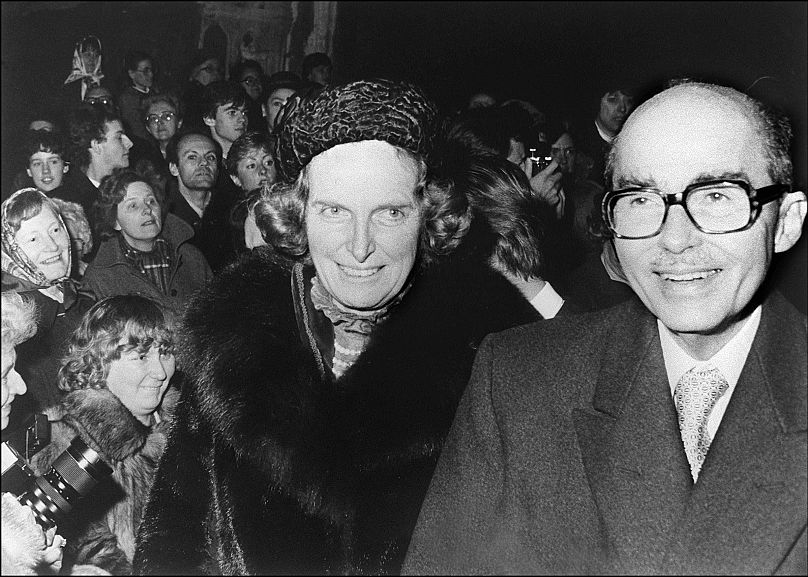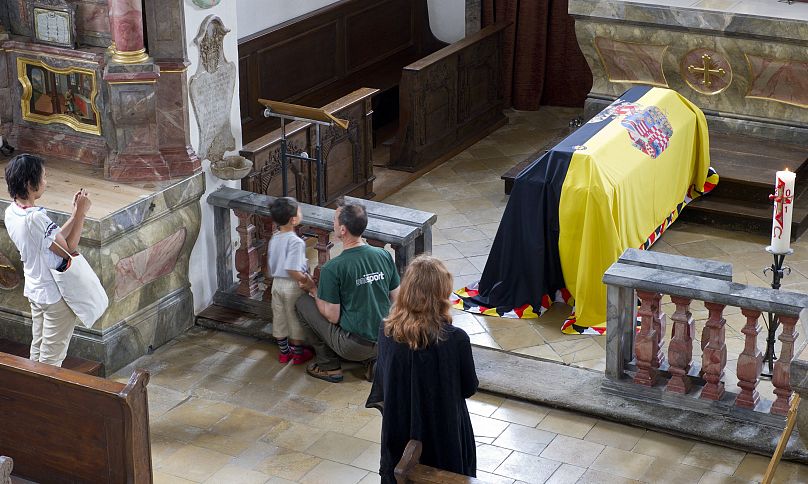György Habsburg, a descendant of the Austro-Hungarian monarchy, has been appointed Hungarian ambassador to France.
In the comments below György Habsburg’s first interview to French media in 2021 as Hungary’s new ambassador to France, some readers demonstrated how far back the bad blood between France and Hungary went by bringing up the memory of Marie-Antoinette.
The hated wife of Louis XVI, who was executed in 1793 during the terror that followed the French Revolution, was the daughter of Empress Maria Theresa and Emperor Francis I, the rulers of the Austro-Hungarian empire - and, as Habsburgs - György’s distant relative.
But despite the fact that it may have been the distant relatives of those Le Figaro readers that relieved Marie-Antoinette of her head, György Habsburg does not share their enmity.
“Thank God we have a free Europe, everyone has the right to their own opinion,” he told Euronews.
Anyway, he said, he received far fewer negative comments below his first appearance in the French press than he generally does when he speaks to the media in Austria, the seat of the Habsburgs for more than 400 years until the empire’s dissolution in November 1918.
Hungary’s relationship with France has improved somewhat since the end of the First World War - not to mention since the French Revolution - but Habsburg told Euronews that he is aware that there is still hostility towards Hungary in the French press and public.
One of his tasks as ambassador to France, he said, was to improve the perception of his country in his new home, and stress that beyond the newspapers, links between the two nations in 2021 are strong. Euronews’ Nóra Shenouda sat down with him to explore the issue further.
You are a descendant of a very powerful dynasty, the grandson of an emperor and king, the son of the last heir to the throne of Austria-Hungary, Otto, who was there at the initial stages of creating the European Union.
Yet today, the Hungarian government is criticised for its Euroscepticism. Do you find that a contradiction?
“I don’t see the Hungarian government as being very eurosceptic. I see a government that criticises processes and political structures in the European Union - and I see that as legitimate because there are a lot of problems in the EU, a lot of things that don’t work well, and which could work better. I’ve not seen a single politician in Hungary who could imagine it would be better not to be a member of the EU. I do not see any intention of leaving the EU. We are in this family and it is important to address what could be done better.
"Hungary does not represent its positions alone but with the cooperation of the Visegrad countries, together they can represent a position as a Central European power. There are debates among them, but if they represent a common Visegrad position, there is a much greater chance that something will change in Brussels.”
You said in your interview with Le Figaro: We think that some of the practices or decisions that have recently been observed in the European Union do not correspond to the basic ideas of the founding fathers of Europe.
“Unfortunately, the European Union wants to have an influence on too many details. We forget that the most important element in the European Union is peace and security. Making the economy work well between countries helps, but peace and security are paramount.
"During the last century there were the First and Second World Wars, the Cold War, the continent disintegrated to East and West and what the European Union has managed to build after all that is amazing. But, unfortunately, we often forget that the most important principles of the European Union are peace and security We deal with too many other problems."
You have been Hungary's ambassador to Paris since March. What do you want to achieve during your term of office?
“From July, Hungary will take over the presidency of the V4 countries, and in this way, it is possible to give the V4 greater visibility. Of course, the French EU presidency will be incredibly important next year and will offer many opportunities to give Hungary more visibility.
"Then the French presidential elections will be held at the same time as the Hungarian parliamentary elections. Senate elections will be held in 2023, which may be a slightly calmer year, but 2024 is the year of the Hungarian presidency of the EU, and at the same time the Olympics will be held here in Paris. So in the coming years, there will be quite a few opportunities to represent Hungary.
"In France, unfortunately, an image has formed about Hungary in the press that is not very favourable. We have to work to change that.
In your interview with Le Figaro, you recalled some interesting details about Hungarian and French relations through history, including the fact that Louis XIV of France sent military aid to Hungary during the Rákóczi War of Independence to help fight your ancestors.
You also noted that in most cases, the two states were on opposite sides in history. There is a certain negative image of the French in the minds of Hungarians while the French also have a prejudiced image of Hungarians. As an ambassador, how can you resolve this?
“I have seen that there is some criticism in the press, but when we look at the full range of relations, we see that trade and economic relations are very good, there are many French investors in Hungary: more than 40,000 jobs are provided by French companies, 550 of which are present in Hungary. The climate issue is also very important to both countries.
"As for my personal background: my father married in Nancy, the capital of Lorraine, and developed a very special bond with this French region. When he worked in the European Parliament, he was a member of the Francophone Working Group.
"Many of the politicians I meet in France worked with my father in the EP, and I have a personal relationship with them because of that and that helps me in my work."
It has been ten years since your father’s death on 4 July. He was a highly respected figure all over the world. How does legacy help you in your current job?
“It helps a lot. I miss my father immensely, he was the best counsellor. The world we live in today, the challenges, the difficulties, the problems… how good it was when I was still able to ask my father what he thought of a particular political situation.
"He lived to be 98 years old and was born in 1912 - the Austro-Hungarian monarchy still existed at that time. In 1916 he became heir to the throne, so he really knew the whole history of the last century. And he was always active in politics. He had tremendous experience. It would be very good to know his opinion when an issue such as Brexit, COVID-19, other European issues arise.
"It is his knowledge of what happened in the last century that I miss greatly. I try to think a little like him. He was always optimistic, I don’t remember him ever being pessimistic about some political process. I also try to be optimistic, and I always try to deal with issues where something works well, and that is when problems are easier to deal with."













